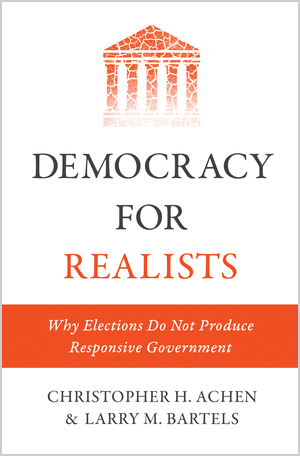
Democracy For Realists – Why Elections Do Not Produce
Responsive Government
By Christopher H. Achen & Larry M. Bartels
Princeton University Press – £22.95
With the upcoming referendum on the European Union – for which there is surely only one, morally sane/right way to go – this more than erudite book couldn’t have been published at a more apt, if not fractious climate amid modern British and European political history.
Just one reason being, Democracy for Realists ”assails the romantic folk-theory at the heart of contemporary thinking about democratic politics and government, and offers a provocative alternative view grounded in the actual human nature of democratic citizens.”
A most assuredly rigorous and tremendous ”provocative” alternative it does indeed offer, replete with more zeal, not to mention political nuance, than a Churchillian connoisseur who ought to perhaps know better. The kernel of the book did after all, begin in earnest way back in 1974, when the two authors, Christopher Achen and Larry M. Bartels, first had a conversation. A conversation that is touched upon in the book’s hearty Preface: ”[…]the book resulted in a kind of intellectual conversation experience for us. Much of what we had believed and trusted turned out to be false. To be faithful to the evidence and honest with ourselves, we had to think very differently.”
The mere fact that they mention as much, warrants some kind of acknowledged applause, which in turn, should be all the more bolstered when they further write: ”In conversation, many readers find this book irritating – or worse. We can only say that we sympathize; we would once have thought it quite irritating, too.”
Hmm, I’d have to say the book’s 328 pages (excluding References and Index) are everything but ”irritating.”
Along with a very substantial list of illustrations which reinforce some very key points (the first of which on page five, immediately asks the question: How important is it for you to live in a democracy/How democratically is this country being governed?), much of the writing is open-ended in as much as it allows so many of the arguments to stand alone, to breath.
In other words, the authors don’t moralise and are in no way, remotely dictatorial – which is what and how true democracy for realists ought to be.
In turn, this might account for each of this superb book’s eleven chapters being a powerful and altogether vital source of thoroughly well-researched, democratic, geographical nuance. The likes of which, one doesn’t come across all too readily.
Let alone everyday.
From ‘Retrospective Accountability’ (”To support the Ins when things are going well; to support the Outs when they seem to be going badly, this, in spite of all that has been said about tweedledum and tweedledee, is the essence of popular government – Walter Lippmann, The Phantom Public) to ‘Groups and Power: Toward a Realist Theory of Democracy’ (”One consequence of our reliance on old definitions is that the modern American does not look at democracy before he defines it; he defines it first and then is confused by what he sees… We become cynical about democracy because the public does not act the way the simplistic definition of democracy says that it should act, or we try to whip the public into doing things it does not want to do, is unable to do, and has too much sense to do. The crisis here is not a crisis in democracy but a crisis in theory – E. E. Schattsschneider, The Semisovereign People), this book really does traverse a terrain that is simply littered with more explosive rhetoric than the authors ought to (not) know what to do with.
Alas, they deal with many an explosive terrain more than comfortably. More comfortably that is, than so many self-styled illusionists whom claim to know about democracy – yet ultimately know very little. That ”the modern American does not look at democracy before he defines it; he defines it first and then is confused by what he sees…,” really doesn’t come as a surprise.
For it is fundamentally, only in America, where the political parameters are forever altered by a baying populace, whom want everything its way.
And not only that – they want it now:
”What do want?
Everything
When do we want it?
Now.”
If nothing else, Democracy for Realists will set minds thinking and trigger an array of debate; which, at the end of the day, is what democracy is all about.
David Marx

